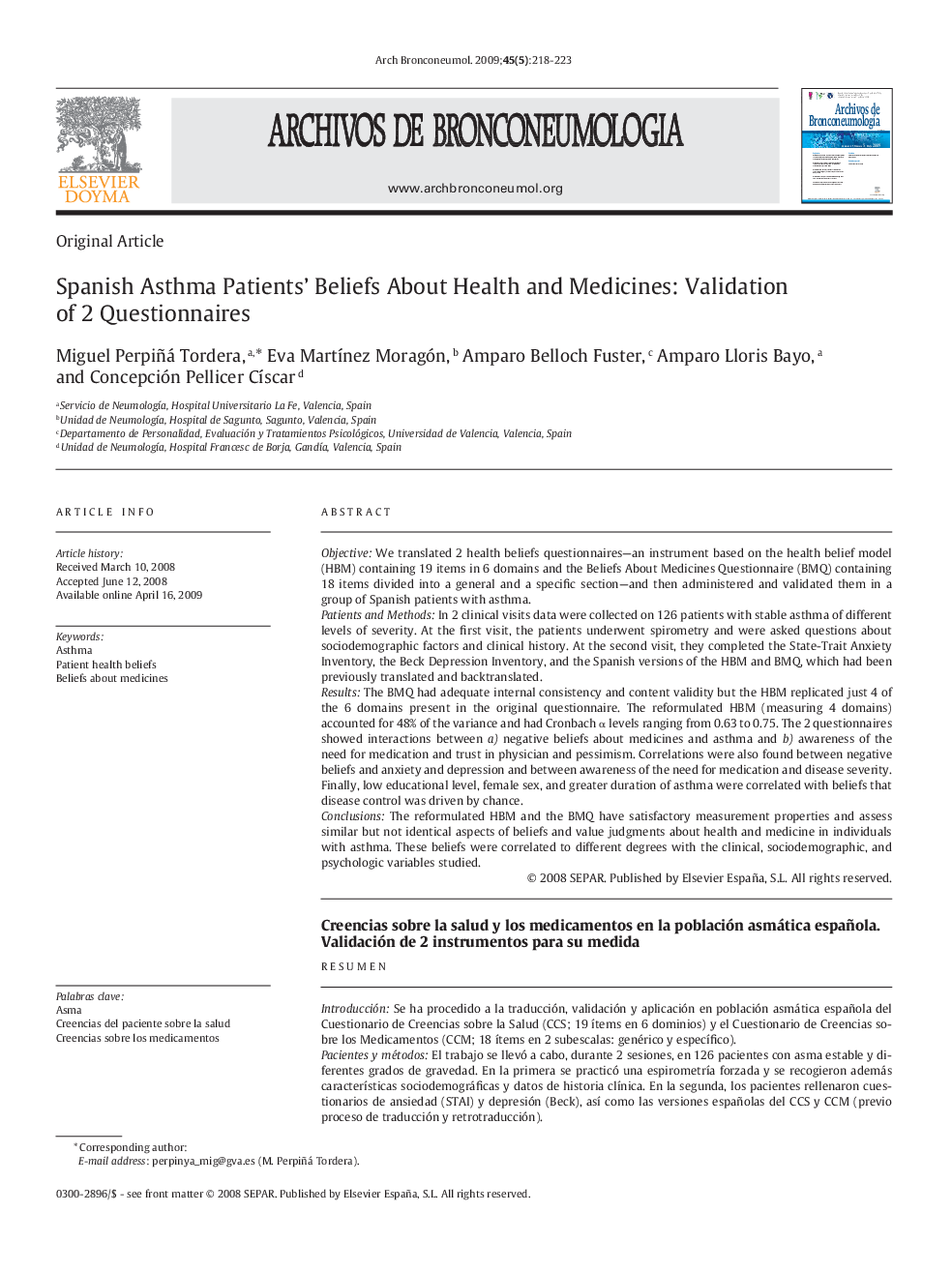| Article ID | Journal | Published Year | Pages | File Type |
|---|---|---|---|---|
| 4206762 | Archivos de Bronconeumología (English Edition) | 2009 | 6 Pages |
ObjectiveWe translated 2 health beliefs questionnaires–an instrument based on the health belief model (HBM) containing 19 items in 6 domains and the Beliefs About Medicines Questionnaire (BMQ) containing 18 items divided into a general and a specific section–and then administered and validated them in a group of Spanish patients with asthma.Patients and MethodsIn 2 clinical visits data were collected on 126 patients with stable asthma of different levels of severity. At the first visit, the patients underwent spirometry and were asked questions about sociodemographic factors and clinical history. At the second visit, they completed the State-Trait Anxiety Inventory, the Beck Depression Inventory, and the Spanish versions of the HBM and BMQ, which had been previously translated and backtranslated.ResultsThe BMQ had adequate internal consistency and content validity but the HBM replicated just 4 of the 6 domains present in the original questionnaire. The reformulated HBM (measuring 4 domains) accounted for 48% of the variance and had Cronbach a levels ranging from 0.63 to 0.75. The 2 questionnaires showed interactions between a) negative beliefs about medicines and asthma and b) awareness of the need for medication and trust in physician and pessimism. Correlations were also found between negative beliefs and anxiety and depression and between awareness of the need for medication and disease severity. Finally, low educational level, female sex, and greater duration of asthma were correlated with beliefs that disease control was driven by chance.ConclusionsThe reformulated HBM and the BMQ have satisfactory measurement properties and assess similar but not identical aspects of beliefs and value judgments about health and medicine in individuals with asthma. These beliefs were correlated to different degrees with the clinical, sociodemographic, and psychologic variables studied.
ResumenIntroducciónSe ha procedido a la traducción, validación y aplicación en población asmática española del Cuestionario de Creencias sobre la Salud (CCS; 19 ítems en 6 dominios) y el Cuestionario de Creencias sobre los Medicamentos (CCM; 18 ítems en 2 subescalas: genérico y específico).Pacientes y métodosEl trabajo se llevó a cabo, durante 2 sesiones, en 126 pacientes con asma estable y diferentes grados de gravedad. En la primera se practicó una espirometría forzada y se recogieron además características sociodemográficas y datos de historia clínica. En la segunda, los pacientes rellenaron cuestionarios de ansiedad (STAI) y depresión (Beck), así como las versiones españolas del CCS y CCM (previo proceso de traducción y retrotraducción).ResultadosEl CCM presentó una consistencia interna y una validez de contenido adecuadas. En cambio, el CCS no reprodujo la estructura original de 6 factores, sino que se obtuvieron únicamente 4 (CCS-reformulado: variancia explicada: 48%; alfa de Cronbach: 0,63-0,75). El CCM y el CCS-reformulado presentaron las siguientes interacciones: a) creencias negativas sobre los medicamentos y la propia enfermedad, y b) conciencia de necesitar medicación, confianza en el médico y pesimismo. Las creencias negativas se asociaron, a su vez, con ansiedad y depresión, mientras que el ser consciente de necesitar medicación se asoció con la gravedad. El bajo nivel de estudios, el sexo (mujer) y una mayor duración del asma se relacionaron con creencias fatalistas sobre el control de la enfermedad.ConclusionesEl CCS-reformulado y el CCM poseen propiedades métricas satisfactorias y evalúan aspectos similares pero no idénticos sobre las creencias y juicios de valor de los asmáticos sobre su salud y los medicamentos. Estos juicios se asocian de manera diferente con las facetas clínicas, sociodemográficas y psicológicas estudiadas.
